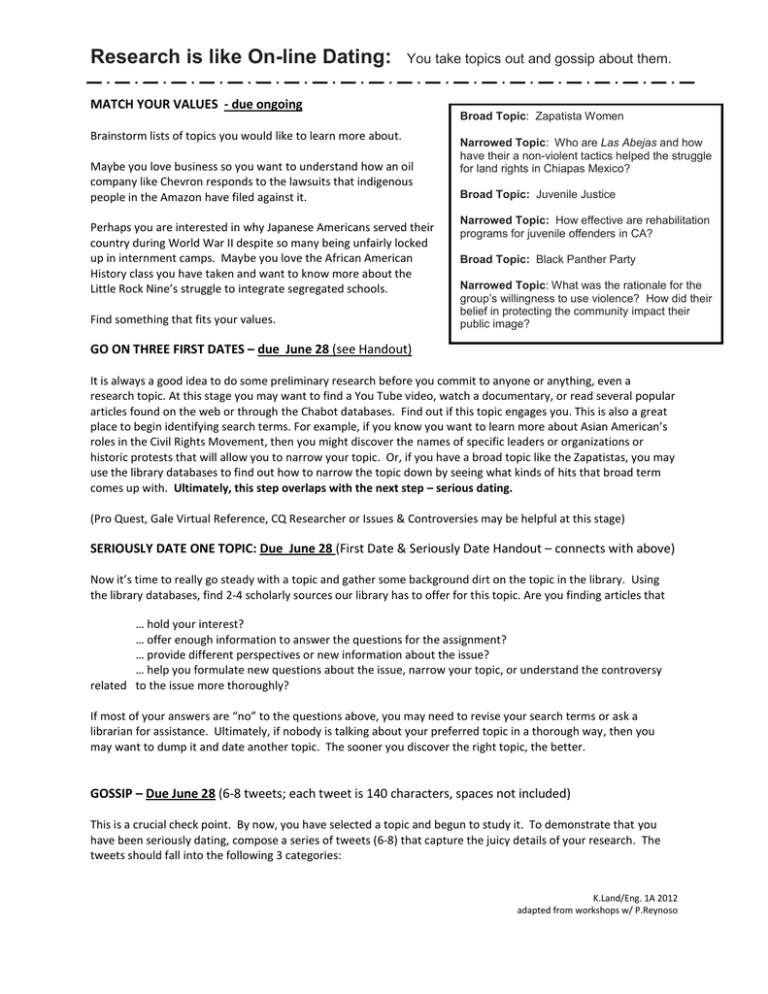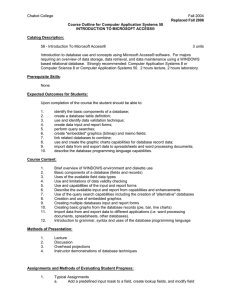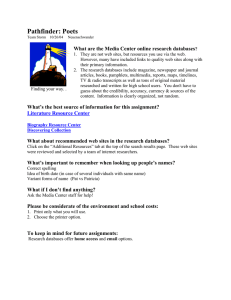Research is like On-line Dating:
advertisement

Research is like On-line Dating: You take topics out and gossip about them. MATCH YOUR VALUES - due ongoing Broad Topic: Zapatista Women Brainstorm lists of topics you would like to learn more about. Maybe you love business so you want to understand how an oil company like Chevron responds to the lawsuits that indigenous people in the Amazon have filed against it. Perhaps you are interested in why Japanese Americans served their country during World War II despite so many being unfairly locked up in internment camps. Maybe you love the African American History class you have taken and want to know more about the Little Rock Nine’s struggle to integrate segregated schools. Find something that fits your values. Narrowed Topic: Who are Las Abejas and how have their a non-violent tactics helped the struggle for land rights in Chiapas Mexico? Broad Topic: Juvenile Justice Narrowed Topic: How effective are rehabilitation programs for juvenile offenders in CA? Broad Topic: Black Panther Party Narrowed Topic: What was the rationale for the group’s willingness to use violence? How did their belief in protecting the community impact their public image? GO ON THREE FIRST DATES – due June 28 (see Handout) It is always a good idea to do some preliminary research before you commit to anyone or anything, even a research topic. At this stage you may want to find a You Tube video, watch a documentary, or read several popular articles found on the web or through the Chabot databases. Find out if this topic engages you. This is also a great place to begin identifying search terms. For example, if you know you want to learn more about Asian American’s roles in the Civil Rights Movement, then you might discover the names of specific leaders or organizations or historic protests that will allow you to narrow your topic. Or, if you have a broad topic like the Zapatistas, you may use the library databases to find out how to narrow the topic down by seeing what kinds of hits that broad term comes up with. Ultimately, this step overlaps with the next step – serious dating. (Pro Quest, Gale Virtual Reference, CQ Researcher or Issues & Controversies may be helpful at this stage) SERIOUSLY DATE ONE TOPIC: Due June 28 (First Date & Seriously Date Handout – connects with above) Now it’s time to really go steady with a topic and gather some background dirt on the topic in the library. Using the library databases, find 2-4 scholarly sources our library has to offer for this topic. Are you finding articles that … hold your interest? … offer enough information to answer the questions for the assignment? … provide different perspectives or new information about the issue? … help you formulate new questions about the issue, narrow your topic, or understand the controversy related to the issue more thoroughly? If most of your answers are “no” to the questions above, you may need to revise your search terms or ask a librarian for assistance. Ultimately, if nobody is talking about your preferred topic in a thorough way, then you may want to dump it and date another topic. The sooner you discover the right topic, the better. GOSSIP – Due June 28 (6-8 tweets; each tweet is 140 characters, spaces not included) This is a crucial check point. By now, you have selected a topic and begun to study it. To demonstrate that you have been seriously dating, compose a series of tweets (6-8) that capture the juicy details of your research. The tweets should fall into the following 3 categories: K.Land/Eng. 1A 2012 adapted from workshops w/ P.Reynoso Identifying Search Terms on First Dates Sample #1: a social movement Topic: Cesar Chavez and the United Farm Workers Inquiry Questions: Why did the United Farm Workers stage a boycott of California grown grapes? How effective was the grape boycott for the United Farm Workers? Why did they choose non-violence as a policy? Identify search terms and search “phrases” relevant to your topic. a. “Grape Boycott” (who/what) b. Effectiveness (question) c. California (location) Think of 1 or 2 synonymous for each search term or search phrase Subject terms used in Chabot databases? a. “United Farm Workers”; “Civil disobedience”; “non-violent resistance” b. benefits Sample #2: a law/policy Topic: Mandatory Sentencing Inquiry Questions: What is mandatory sentencing? Why is it used for teens? Is it effective at preventing crime? Is it cost effective? What are the drawbacks? Identify search terms and search “phrases” relevant to your topic. a. “mandatory sentencing” (what) b. youth (who) c. “United States” (location) a. cost (question) b. effectiveness (question) c. “mandatory sentencing” (what) d. California (location Think of 1 or 2 synonymous for each search term or search phrase Subject terms used in Chabot databases? a. “punishment” ; “laws” b. “juvenile delinquents”; “adolescent offenders” c. California a. “rehabilitation programs” b. “recidivism rates” K.Land/Eng. 1A 2012 adapted from workshops w/ P.Reynoso Two First Dates: Due ________ First Date #1 1. Topic: 2. Inquiry Questions: 3. Fill in the table below before searching the library databases and then add terms when you visit the library. Identify search terms and search “phrases” relevant to your topic. Think of 1 or 2 synonymous for each search term or search phrase Subject terms used in Chabot databases? First Date #2 1. Topic 2. Inquiry Questions: 3. Fill in the table below before searching the library databases and then add terms when you visit the library. Identify search terms and search “phrases” relevant to your topic. Think of 1 or 2 synonymous for each search term or search phrase List subject terms used in Chabot databases K.Land/Eng. 1A 2012 adapted from workshops w/ P.Reynoso Getting Serious & Gossip 1. Getting Serious: Which topic do you plan to date more seriously? Why? 2. Gossip: What have you learned that was particularly interesting so far? Have you found articles that hold your attention? Do you think you might need more assistance in this area? in creative “tweets”. Capture your learning Tweet your Gossip (140 characters) THE PROCESS (1-2 tweets): How is the research process going? (Have you had successes/challenges? Did you learn tricks for using databases or entering key terms? What library resources have you found useful?) NARROWED TOPIC (1-2 tweets): What narrowed topic will you focus on? Phrase the topic as a question and be sure it indicates that you have investigated the topic and adjusted your original thinking if needed. JUICY GOSSIP (minimum 4 tweets): Share key new information you have discovered that covers some of the questions in the prompt. K.Land/Eng. 1A 2012 adapted from workshops w/ P.Reynoso Summer 2012 English 1A: Research Project At this point in the semester, we have examined how societal structures can reproduce inequality and how a community’s cultural wealth – particularly resistant capital – can temper some of that inequality. In Paper #3, we will explore what it means to courageously resist oppression and whether it is a person’s moral duty to do so. You will evaluate how the Huaorani have dealt with their oppressive circumstances by applying Dr. Martin Luther King’s concepts of non-violent, militant resistance to Savages (assignment to follow). In Paper #3, you will also integrate outside research. Since the theme of Paper #3 is the “courage to resist,” your research topic should fall into one of these two broad categories: Social Movements – Investigate a social movement. What “cause” is the group fighting for? What kind of oppression does the group experience? How does the dominant culture view that group? How does the group communicate its message to the broader community? How successful has the group been in generating allies or public support for the cause? In what ways is this group courageously resisting oppression? Brown Berets Greensboro Four or Freedom Riders Black Panther Party Occupy Oakland Asian American Movement (Grace Lee Boggs or Vincent Chin) Zapatistas (Las Abejas), Cesar Chavez and the United Farm Workers, Japanese Americans Citizens League (and the Nisei Draft Resisters), Chinese American Social Movements pre- WWII Laws or Policies – Investigate a law that has had some major impact on a group’s human rights in US society. How has this law promoted (or denied) equality for a specific group? Why do supporters of the law advocate for it? What are some of the arguments detractors of the law offer? Is there a need for citizens to be involved in supporting (or resisting) the implementation of this law? Would such protesters require significant courage to voice their opinions? Have such protests occurred and been successful? 3 Strikes Law in CA or mandatory sentencing laws Rehabilitation programs for juvenile offenders California’s Prop 8 Ban on Ethnic Studies Programs in Arizona Guest Worker Programs Anti-immigrant laws like Arizona’s AB 1070 or California’s Prop 187 A constitutional amendment banning same-sex marriage Amnesty for Undocumented Immigrants a Federal DREAM Act Calpine Power Plant in Hayward Gang Injunctions K.Land/Eng. 1A 2012 adapted from workshops w/ P.Reynoso


